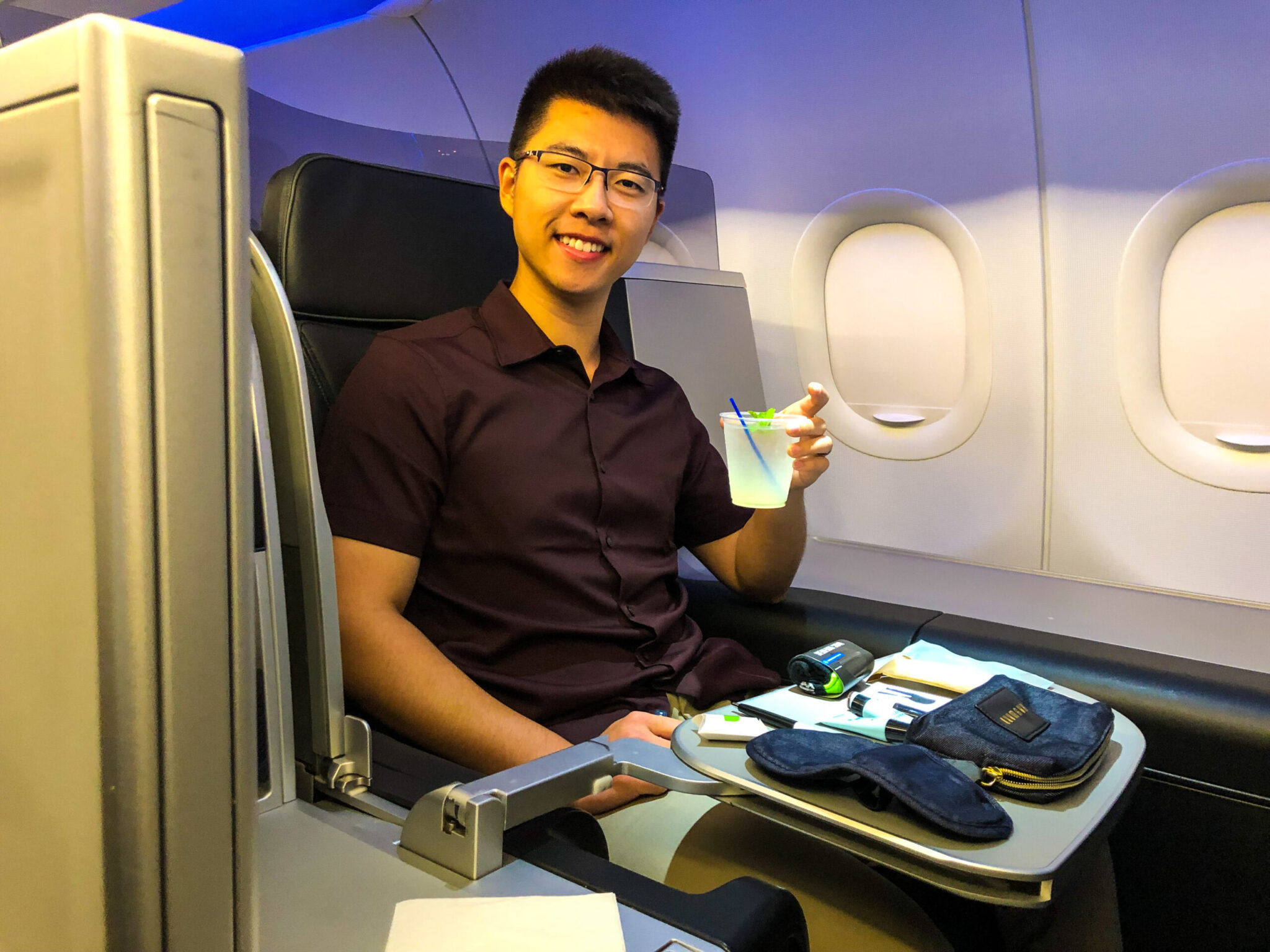Credit card points have the potential to permanently transform the way you travel.
This is one of the key mantras and takeaways you will receive the more time you invest in learning about credit card points and more. And while it’s so easy to focus on tips to start travel hacking, it’s equally important to focus on what not to do.
If your end goal is to amass a large chunk of credit card points consistently, only fly in business/first class, and even stay in top-notch luxury hotels like the St. Regis New York, you’ll want to pay close attention to this guide. Let’s get started!
Find out how to maximize your points!
-
10 Things People Get Wrong About Credit Card Points and Luxury Travel
- 1. Booking Business/First Class Is Incredibly Expensive
- 2. It Will Take Forever to Accumulate Enough Points For First Class Travel
- 3. I Don't Spend Enough To Get Lots of Points
- 4. Signing Up For Cards Often Will Destroy Your Credit
- 5. What About All The Annual Fees?
- 6. I'll Lose My Points If I Close My Card
- 7. Travel Hacking Takes Too Much Time
- 8. I've Never Flown In Business/First Class And I'm Fine With Flying In Economy
- 9. I Don't Travel Enough To Take Advantage of Travel Hacking
- 10. What I'm Doing Is Working For Me. What's Special About AuPACS?
- Wrapping Up
- FAQs
10 Things People Get Wrong About Credit Card Points and Luxury Travel
Over the years, we’ve had the opportunity to listen to the most glaring concerns of our clients. As it turns out, people’s preconceived notions are often wrong.
And if you want to go against the grain and travel in first class for free, you’ll need to completely rethink what you know about credit, points, and the process of booking travel.
Here are our top 10 things people get wrong about credit card points and luxury travel.
1. Booking Business/First Class Is Incredibly Expensive
At first glance, it may seem reasonable to think this because first class plane tickets are reserved for those who can afford to pay tens of thousands of dollars for a single flight. And if you’ve ever searched for a flight on AmexTravel, you know just how expensive these flights can be.
However, true travel hackers rarely book through these travel portals — they use transfer partners to reduce the cost of an international business class ticket from 1,000,000 points to a fraction of the original cost. For example, if you’re looking for a ticket from San Francisco to Copenhagen in business class, you’re looking at an average cost of $5,000+ one-way.
You’ll probably pay somewhere around 700,000-1,000,000 points just for this ticket! Meanwhile, you can redeem points to cut down the cost to something much more manageable: less than 100,000 points round-trip!
Accumulating 100,000 points is a lot easier than accumulating 1,000,000 points.
Plus, in a post-pandemic world, there’s a health incentive to fly first class comfortably for maximum social distancing. While first class is absolutely the best option, many business class seats are extremely private for maximum social distancing, too.
2. It Will Take Forever to Accumulate Enough Points For First Class Travel
One of the biggest, if not the biggest misconceptions about first class travel is that it’ll take years to earn enough points for a single first class flight.
You might be thinking that only business owners are able to maximize their rewards and rack up tons of points.
Luckily, one of the easiest ways to accumulate lots of points is to sign up for the best credit cards. The best credit cards come with introductory bonuses of anywhere from 50,000-100,000 points after spending around $1,000-$5,000 in the first 3 months. There are plenty of these credit cards, and the rewards landscape is only getting better and better.
As an example, I was able to pay a whopping $5.60 after redeeming 80,000 American AAdvantage miles to fly in Japan Airlines first class, a ticket that usually costs $12,000-$15,000!
If you estimate that a business class ticket will cost 100,000 points round-trip or 50,000 points one-way, you’ll quickly find out that signing up for 1 or 2 credit cards and getting the bonus will get you a business class ticket to Europe! Sustainably doing this is at the heart of our 16-week course, The Points University.
By signing up for cards regularly and meeting the initial spending requirement to get the welcome bonus, you’ll quickly find yourself with a growing pile of points that you can use for luxury travel.
3. I Don’t Spend Enough To Get Lots of Points
Another unfounded concern people have about points is that they simply don’t spend enough to start travel hacking.
If you spend $1,500 or more per month, you can start travel hacking.
The process of signing up for cards for the sole purpose of getting the bonus typically only requires a total spending requirement of $1,000-$5,000 in the first 3 months. This translates to spending $333-$1,667 per month in spending.
When you focus on these bonuses, you’ll find that you can make your spending go a lot further. You’ll start accumulating 10-30 points per dollar instead of 1-5 points per dollar in this way.
Find out how to maximize your points!
4. Signing Up For Cards Often Will Destroy Your Credit
You’ve probably heard that when you apply for a credit card, you’ll get “dinged” on your credit report.
And while this statement is true, it needs some clarification.
That “ding” on your credit report? That’s called a hard inquiry. All this is is a line on your credit report saying that you applied for credit, whether it’s for a mortgage, credit card, auto loan, student loan, or personal loan.
Here’s how your credit score will behave when you apply for a credit card:
- You apply for a credit card. You might see an initial decrease of 5-10 points when a hard inquiry first hits your account.
- When you get the new credit card in the mail and start making purchases on it to get the bonus, the activity will be added to your credit report. This is known as building credit history.
- After a few months, the initial decrease will be counteracted by the positive effect of building credit history.
- You’ll see your credit score shoot back up to where it was before and continuing to go up as you continue building credit history, even if you don’t use the card any longer.
So your credit score might go down when you first apply for the card, but it’s only for a short period of time. In fact, the hard inquiry’s effect wanes a year later and disappears completely after 2 years. Plus, your hard inquiries only make up 10% of your credit score!
At the end of the day, most travel hackers have excellent credit because they understand how credit works.
5. What About All The Annual Fees?
Annual fees are charged to credit cards every year. Typically, annual fees range from $75-$595.
When you sign up for a card to get the bonus, you’re doing so intending to cancel the card sometime after actually getting the bonus.
Typically, the rule of thumb is to cancel a card 1 year after opening it.
In some cases, it makes a lot of sense to keep a card open. For example, if you are able to get $200 in value every year from a card that charges a $75 annual fee, it’s a no-brainer to keep it open. It almost always makes sense to keep a card open if it has a long credit history attached to it. Lastly, you might be able to get a sweet retention bonus for keeping a card open!
And in almost all situations, it makes a ton of sense to get a bonus in spite of any annual fees that might exist. For example, if you signed up for a card that gives you $1,000 in free travel, so what if there’s a $95 annual fee? It probably makes a lot of sense to pay $95 to get $1,000 back.
Annual fees are a temporary expense. The points and miles you’ve earned are a permanent asset. Don’t let annual fees deter you from achieving the travel lifestyle you want.
Find out how to maximize your points!
6. I’ll Lose My Points If I Close My Card
If I close my credit card, won’t I lose the points I’ve earned from that card?
This is a frequently asked question that also requires clarification!
In most situations, you will not lose the points you’ve earned on a credit card if you close it. Typically, credit cards fall into 1 of 2 buckets:
- Proprietary bank rewards credit cards – these credit cards earn points tied to a bank’s rewards program. Examples include the Chase Sapphire Preferred card, the Amex Gold card, and the Citi Premier card.
- Co-branded loyalty program credit cards – these credit cards earn points tied to an airline or hotel program. Examples include the Chase World of Hyatt Credit Card, the Delta SkyMiles® Platinum American Express Card, and the Barclays AAdvantage® Aviator® Red World Elite Mastercard®.
When you cancel a co-branded credit card (#2), you will almost never lose the points/miles you’ve earned. This is because the miles and points you’ve already accumulated are sitting in your loyalty account, not your credit card account.
When you cancel a bank rewards credit card (#1), you can lose the points/miles you’ve earned if you don’t take the right precautions. You can move the points on this credit card to a different credit card in the same family, which will keep your points alive. The exact steps you have to take depends on which credit card you have, but just remember that you don’t have to lose your points/miles when you cancel a card.
There are very few situations in which you’ll actually lose your points if you close/cancel your credit card. In almost all situations, you can avoid losing your points.
7. Travel Hacking Takes Too Much Time
Travel hacking is an undertaking that requires good management and record keeping.
If you approach this process efficiently, you can make your dream travel happen by dedicating 30 minutes to an hour of your time every month.
In a society of instant gratification, those who invest the time up-front will reap the biggest rewards.
Almost all of the time you’ll spend every month will either be filling out a credit card application or closing a credit card. Either of these typically takes less than 15 minutes each. It’s a small commitment to make if it means you can book some of the best first class flight deals using points!
As an AuPACS customer, you will receive a detailed spreadsheet to help you keep the most accurate records!
Find out how to maximize your points!
8. I’ve Never Flown In Business/First Class And I’m Fine With Flying In Economy
If you’ve never flown in business or first class and you’ve flown in coach all your life, it might be difficult to understand the value proposition.
But here’s the deal. Economy sucks.
The service, how cramped your seat is, how close you are to everybody else, the complete lack of privacy, and everything else about economy is terrible.
Sure, if you’re flying just for a few hours, economy is fine. But what about anything longer than that? Do you really want to be inhumanely stuffed into a steel tube like some sort of caged animal?
You might have flown in economy because you weren’t comfortable spending thousands of dollars on a plane ticket.
But now that you know you can use points to fly cheaper than economy. What’s more, is that using points to fly in business and first class doesn’t have to be 10 times as expensive! It might only cost 20-30% more than an economy ticket!
Travel is supposed to be relaxing, not stressful.
When you fly in business/first class, you’ll enjoy some of the best airport lounges and comfortable seats that transform into beds! You’ll savor world-class dining, phenomenal service, and build some unforgettable memories by traveling in style.
Imagine if, every time you traveled, you and your partner only flew first class and stayed in 5-star hotels, and you never had to pay for it.
That’s what travel hacking does for you.
9. I Don’t Travel Enough To Take Advantage of Travel Hacking
In the past, only frequent business travelers could earn enough points to get a free flight sometimes.
But nowadays, most people will earn a majority of their points from regular credit card spending.
And you might be thinking: I just don’t travel enough to start travel hacking.
As a society, we seem to be working longer hours and vacationing less.
Even if you see yourself taking just 1 trip per year, it can be worth it to start optimizing your points. If you have a desire to travel to places like London, France, Japan, Italy, and Australia, you’ll save a bunch of money by using points and elevate your travel experience by flying in business and first class.
Plus, who knows when you’ll book your honeymoon or that last-minute exotic trip? You might see plane tickets in economy that look like extortion and be thankful that you have points to cushion the cost! Instead of stressing about paying for a $10,000 plane ticket, you’ll be happy you used points to book your travel and pay just $50 out of pocket.
Find out how to maximize your points!
10. What I’m Doing Is Working For Me. What’s Special About AuPACS?
Unless you’ve spent years and years learning about points and travel, there’s a ton of room in your portfolio to be smarter about your points.
We’re the best at helping you get the most points. We’re the best at helping you use the points for booking luxurious travel experiences.
Why would you earn 2 points per dollar when you can earn 15 points per dollar?
Why would you spend 500,000 points on an international flight when you can spend 100,000?
Why would you take your family on vacation in coach and crummy AirBnBs if you didn’t have to?
AuPACS provides you with the best points and travel expertise in the world. If you can’t make the forward investment for your family’s and loved ones’ sakes, then there’s not much help we can offer.
But if you’re financially responsible… if you consider travel to be an essential part of your life… if you are thinking about the future, you’ll begin to see the world AuPACS will open you up to.
Wrapping Up
When it comes to credit card points and travel, there’s a lot of noise out there.
Everybody seems to have expertise in knowing what the best credit cards are and how to get free flights with points.
But until you’ve booked the world’s most expensive, most exclusive first class tickets, there’s still a lot you can do.
Until you’ve stayed in some of the world’s most luxurious hotels for free, there’s still a lot you can do.
You don’t know what you don’t know, so schedule your free initial consultation with AuPACS today



Your points are all valid, but when flying from Australia there are limited airlines linked to Credit Card providers. This is not an issue in the USA.
When flying from Australia and using Qantas points there seems to be VERY high taxes charged by Qantas, under the guise of govt taxes. For example Sydney to Zurich return in Business Class has AUD$7600 in taxes.
Very interested to learn how your strategies would be applicable for someone flying from/to Australia
Hi Christopher,
The root of those surcharges is from the flight leaving Europe going back to Australia. You’ll notice that the flight going from Australia to Europe doesn’t have fuel surcharges because the government of Australia regulates these.
Unfortunately, this is something that’s difficult to avoid, but the bright side is that you can pay a lot less than a regular paid flight with points.